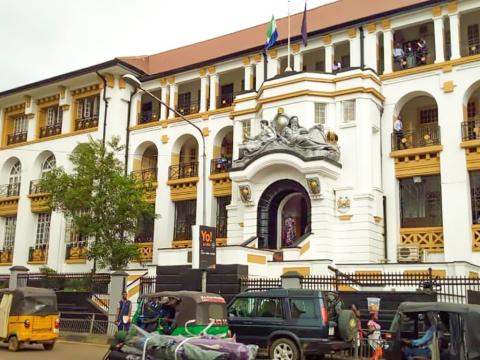By Francis H. Murray
Justice Augustine Musa of the High Court in Freetown has ruled that the High Court in Kono lacked the jurisdiction to hear and determine the substantive matter between Koidu Holdings Ltd and the Affected Property Owners in Kono.
In his ruling on Wednesday 30th September, 2020, Justice Musa noted that because the present action in respect of the matter was issued in Kono, where there is no district registry, it rendered the court defective on grounds of jurisdiction.
‘‘In view of the foregoing analysis, I hold that on the first question for determination that the present action was filed in Kono and further since there is no district registry in Kono, it could not be said that a writ could be issued from its registry. I further agree with counsel for the defendant applicant that the said writ has not been signed and sealed by any of the registrars in the district registries,’’ he noted.
He went on to note that in the event where the court lacks the jurisdiction, the matter reaches an end.
However, in respect of the second objection raised by the defendant applicant about the absence of a ‘‘full and frank disclosure,’’ justice Musa said that same had not been successfully argued.
The ruling is part of an ongoing court action initiated by Morie Momoh and fourteen others who call themselves Marginalized Property Owners against Koidu Holdings Ltd and its subsidiary companies, including Octea Ltd, for what they referred to as breaches in the Community Development Agreement and the Mining Lease Agreement signed between them.
The affected property owners had raised concerns and claimed damages arising from the exploitation of minerals, environmental damage, and deprivation of property including land.
The aggrieved parties also say that the company was in breach of the resettlement agreement that was provided under the lease mining agreement which called for the proper resettlement of the affected land owners before the commencement of mining operations.
Lawyer Chernor M. Jalloh, who is representing the aggrieved property owners, said when they initiated the action on behalf of the communities of Tankoro and Gbeseh chiefdoms on the 5th of February 2020 in Kono, they realized that Koidu Holdings Ltd and their parent body abroad were facing serious financial difficulties which may result in them falling back on their properties in Sierra Leone in order to settle their debts abroad.
He added that in an effort to prevent their clients from being exposed to such reactive action from the companies in the wake of their financial difficulties, they filed for freezing orders at the High Court in Freetown from Kono, on the assets of the company situated within the country.
He explained that the freezing orders they seek are meant to prevent the companies from transferring their assets outside the jurisdiction of Sierra Leone pending the hearing and determination of the proceedings they have issued.
On the other hand, the defendant applicants represented by lawyer Drucil E. Taylor had also filled an objection against the said action on the grounds that it was not supposed to have been filed in Kono which they argued lacked an official district registry as provided for by law.
He had also argued that the plaintiff or complainants in the process of filing such summons, failed to disclose every material facts as provided for by law in respect of the matter.
Describing the ruling as a win-win situation for both parties, Lawyer Bah further disclosed that paper work was ongoing to file the writ of summons in the appropriate district registry as provided for by law, in order to proceed with their action to freeze the company’s assets.
He added that what the ruling implied was that all other civil matters which have been presided over in Kono have been annulled even though Kono has a resident High Court presided over by a judge and a registrar.
He further noted that the ruling has practical legal implications on litigants in civil matters in Kono, describing it as an impediment to access to justice.
‘‘Despite the fact that there’s a resident judge in Kono, there’s a resident registry in Kono which is under the Kenema District registry, our understanding was that for accessibility, we can issue this in the registry in Kono. But now a High Court Judge has ruled that no, despite the fact that there’s a resident judge in Kono, there’s a resident registry in Kono and Kono is under the Kenema District registry, no civil proceedings can be issued in Kono unless if they want to, they can go and issue it in Kenema. That has a huge practical implication for so many litigants in Kono and it impedes access to justice,’’ he noted.
Lawyer Jalloh also urged the Chief Justice and the rules of court committee to issue out a directive that allows civil matters to be heard in Kono.
‘‘I will take this opportunity to call on the Chief Justice to ensure access to justice for so many litigants in Kono by issuing a practice direction constituting Kono District registry as a registry where civil proceedings can be issued as that will help a lot. With this ruling today, all the fleet of summons and actions issued from Kono are a nullity and it offends the process of access to justice,’’ he concluded.
Copyright © 2020 Politico Online








